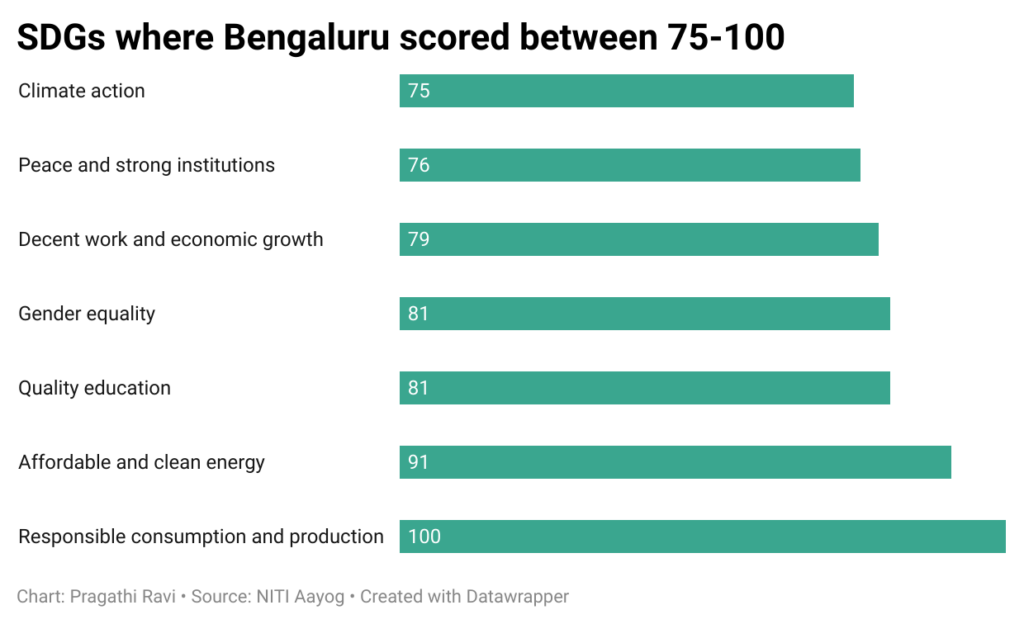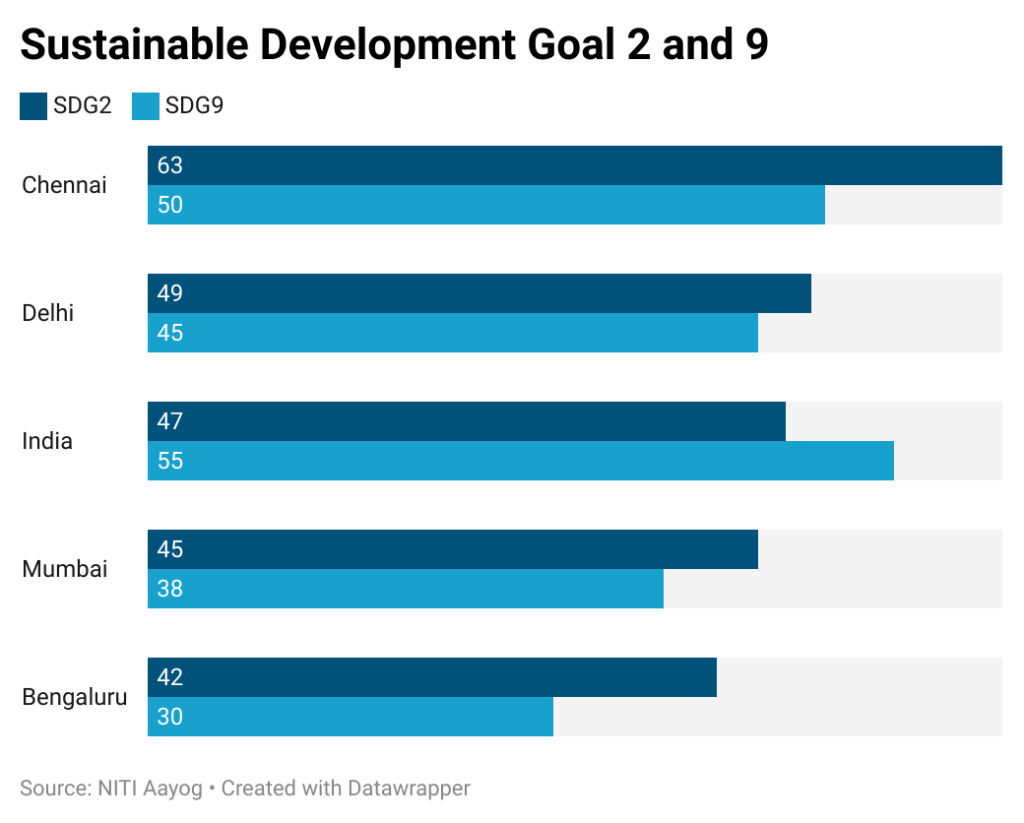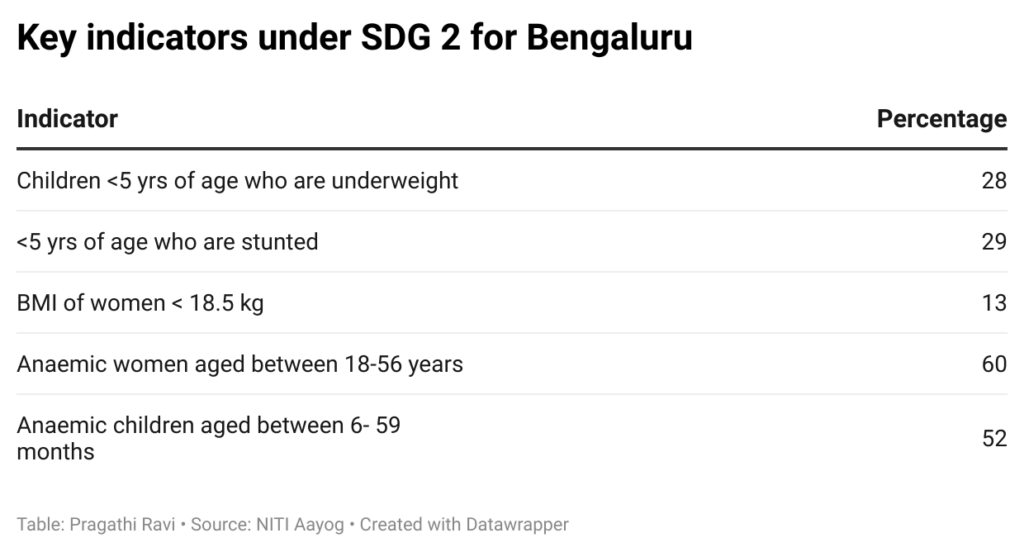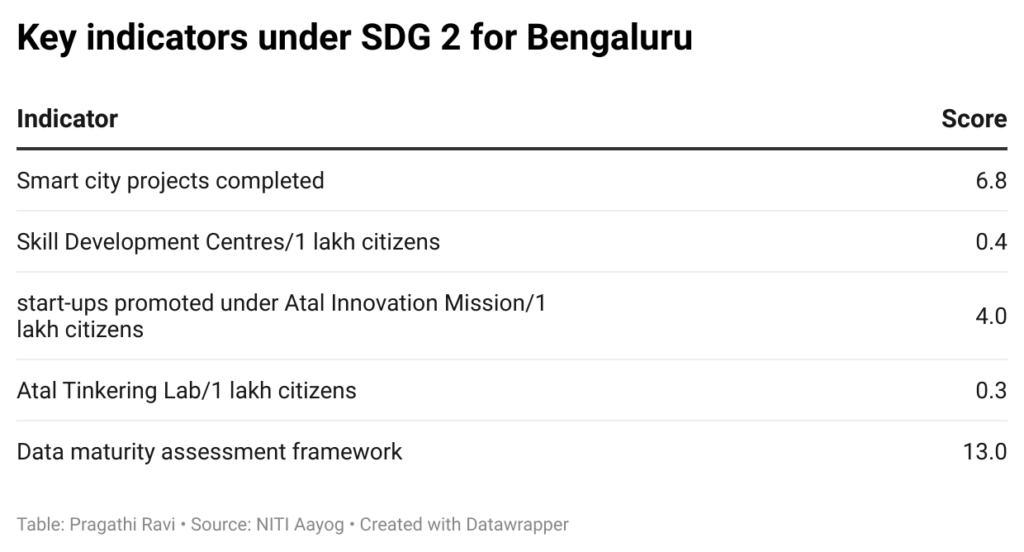The United Nations adopted the Sustainable Development Goals (SDG) in 2015 to universally take a stand to end poverty and protect the planet. The UN set 2030 as the target year to achieve these goals, which India has accepted.
NITI Aayog’s inaugural SDG Urban Index and Dashboard for 2021–22 is aimed at driving SDG localisation in Indian cities, under the umbrella of Indo-German Development Cooperation.
The policy think tank’s monitoring tool at the Urban Local Body level localises the global goals. The dashboard’s index framework consists of 56 ULBs and 77 indicators (from 15 SDGs). The data on these indicators have been sourced from official datasets such as NFHS, NCRB, U-DISE, data portals of ministries, and other government data sources.
As per national statistics, 16% of the 56 urban areas have at least one member in the household covered by a health scheme. For 37 urban areas, nine out of 10 births are in medical institutions. For 19 of the areas, the sex ratio at birth is equal to or greater than 950.
How has Bengaluru fared across these indicators?
The city’s profile
The index ranks Bengaluru 13th in the country. Shimla tops the index, followed by Coimbatore and Chandigarh. The city is ranked against the 17 goals and has an average score of 69.07. Out of 100, Bengaluru scores 75 and above in seven goals that address quality education, climate action, responsible consumption, gender equality, affordable and clean energy, and economic growth.

The city scored 100 for SDG12– Responsible Consumption and Production, which targets achieving sustainable management and efficient use of natural resources and reducing waste generation. The goal also promotes public procurement practices that are sustainable, and in accordance with national policies and priorities while also aiming to reduce food losses along production and supply chains.
Bengaluru fared well in terms of the quality of education (SDG 4) and looks to be on the path to ensuring all children get free, equitable and quality primary and secondary education. With a score of 91 for affordable and clean energy (SDG 7), the city is striving towards achieving universal access to affordable, reliable and modern energy services that increase its share of renewable energy by 2030.

However, the picture isn’t entirely rosy. Bengaluru fared poorly in two key areas: zero hunger and industry, innovation and infrastructure. The city ranked lower than its metropolitan counterparts like Delhi, Chennai, and Mumbai and also fell below the national average of the aforementioned goals.
Read more: Sustainable Development: Strategies for the long road ahead in Indian cities
SDG 2- zero hunger
SDG 2 aims to eradicate hunger by 2030 by ensuring access to safe, nutritious and sufficient food all year round to all, in particular the poor and people in vulnerable situations, including infants. The goal is also committed to ending all forms of malnutrition, reducing instances of stunting and wasting in children, and “addressing the nutritional needs of adolescent girls, pregnant and lactating women and older persons.”
However, the index informs that the city has a long way to go in realising this goal. The National Family Health Survey 5 (2019-20) for Bengaluru found that 31.3% of children below the age of 5 were stunted, 3.2% higher than in 2015-16 (NFHS 4). 19.2% of the children within the same age group were found to be wasted, 11.4% of them severely. Further, 28.1% of the children were underweight and 4.3% were overweight.
The survey also found that the Body Mass Index (BMI) of those aged between 15 and 49 years was below normal for 10% of women, a drop from 14% as per NFHS 4.

The index found 27.95% and 29.41% of the children, below the age of five, were underweight and stunted, respectively. 59.81% of the women between the ages of 18 and 59 years and 52.16% of 6-59 months old children were also found to be anaemic. This data sets Bengaluru far from achieving the zero hunger goal in the next eight years and highlights the need to strengthen the implementation of government schemes meant to address this, especially among those from weaker socio-economic groups, who are more susceptible to these.
SDG 9- Industry, innovation and infrastructure
SGD 9 envisions building resilient infrastructure, fostering innovation and promoting inclusive and sustainable industrialisation. The goal is aligned towards increasing access to small-scale industrial enterprises, enhancing scientific research, and upgrading technological capabilities at the domestic level. It also aims to increase the number of research and development workers per one million people and public and private research and development spending.

In April this year, Citizen Matters reported on the hasty release of the BBMP budget 2022-23, with Rs 6,911.5 crore having been earmarked for the Public Works Department. This budget allocation was primarily for road development carried out under the CM Nava Nagarotthana Yojana. The road works include asphalting, construction of underpasses, white topping and road restoration, among other tasks.
Read more: After one year as minister for Bengaluru, CM Bommai has many promises to keep
In the May 2022 report, Vinayak Sugur, the chief engineer of Bengaluru Smart City Ltd. (BSCL), was quoted as stating that 11 of the 46 projects underway in the Central Business District (CBD) area have been completed. The report also states that the city received the lowest amount of funds under the National Smart Cities Mission, compared to other cities.
As per the index, only 6.8% of the projects under Smart City have been completed against tendering. There are only 0.38 incubation or skill development centres per one lakh Bengalureans and 4.04 start-ups per one lakh population were promoted under the Atal Innovation Mission.
Earlier this year, Delhi replaced Bengaluru as the start-up capital in the Economic Survey 2022.